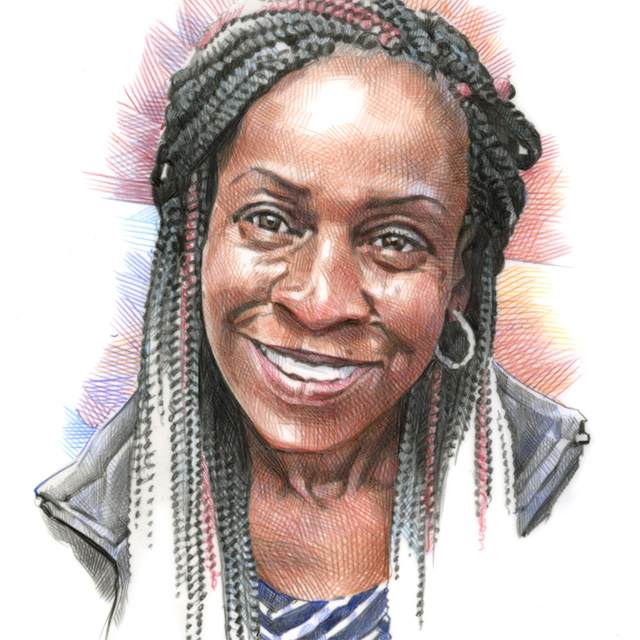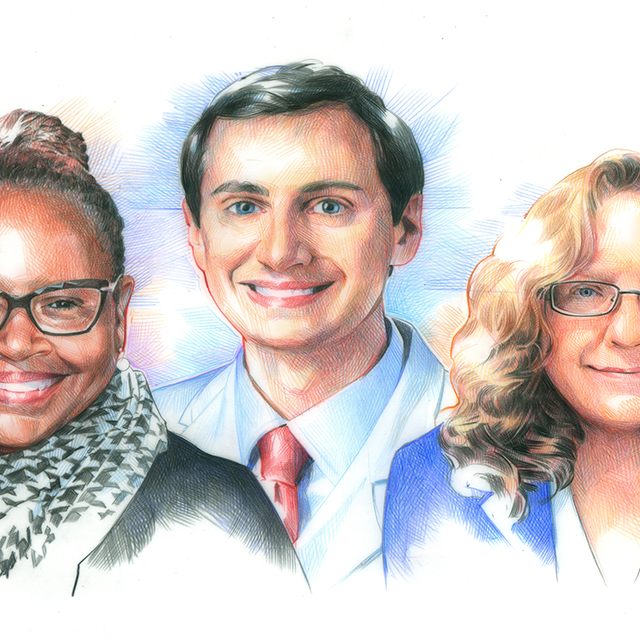One December afternoon in 2018, pediatric operating room nurse Grace Babia headed to the international office at Johns Hopkins Outpatient Center to finally meet Juan Carlos “JC” Vega, a 10-year-old boy from the Philippines in need of surgery to correct a rare congenital deformity. She’d been looking forward to this day and recalled the promise she’d voiced to Vega’s surgeon, John Gearhart, about her new patient: I want to give him and his father a tour of Washington, D.C.
“If I didn’t do it then, I thought it would never happen,” recalls the Johns Hopkins Children’s Center operating room nurse, who’d arrived in Baltimore from the Philippines herself 13 years before. She knew major challenges lay ahead for the youngster whose bladder was formed outside his abdominal wall — bladder exstrophy — and she wanted to provide a fun distraction.
But JC and his father were too exhausted to go sightseeing, and the upcoming surgery loomed large. Indeed, the 12-hour procedure to reconstruct JC’s bladder and reset pelvic bones would require a difficult, two-month-long recuperation.
JC’s journey to Johns Hopkins began with a Facebook post describing his plight after unsuccessful surgeries. A grateful parent of a child who was treated at The Johns Hopkins Hospital for the same condition happened to read the post. She immediately contacted orthopaedic surgeon Paul Sponseller and urologist John Gearhart, who had operated on her son several years earlier.
Things moved quickly after that. Johns Hopkins Medicine International arranged for Gearhart and Sponseller to meet to discuss a potential operation on JC. Then, in the weeks leading up to JC’s scheduled operation, Babia orchestrated a series of kindnesses to take place once he and his father arrived.
“As soon as Grace heard about the case, she took matters into her own hands,” recalls Gearhart. “It touched our hearts.”
Babia knew the Vegas were a family of little means, and father and son would sorely miss their family and friends. So she reached out to the Baltimore Filipino community, her church and Johns Hopkins colleagues for support with food, clothing and companionship.
Ideally, bladder exstrophy surgery should take place at birth, says Gearhart, but JC’s unsuccessful operations in Manila didn’t occur until the boy was 9. He was forced to live with excruciating pain, chronic infections and incontinence. Yet, recalls Gearhart, “For a child who has been through two major surgeries, JC was the sweetest, nicest boy.”
Johns Hopkins surgeons perform about 10 to 20 bladder exstrophy surgeries every year. Having assisted physicians over the past decade during these complex operations, Babia was well-versed in the struggles that lay ahead for the young patient.
“I told JC and his dad, ‘I don’t know what I can do, but I want to make things better for you,’ says Babia. “They were nothing but grateful.”
There’s a Filipino term for this kind of support: bayanihan (buy-uh-NEE-hun). It has come to mean communal spirit, accompanied by an outpouring of kindnesses. And, when adversity strikes a family, the community swoops in to support them.
For Babia, that bayanihan began with logistics in securing housing with a Filipino family and introducing the Vegas to members of her Middle River church, who provided additional support — financially and emotionally.
Christmas was just 10 days away, and the weather was turning cold, recalls Babia. In the Philippines, she points out, “the weather is always beautiful — like paradise.” JC and his father arrived in Baltimore coatless. Within days, Babia presented JC and his father with a box of warm clothes, including coats, along with “bucket” money collected at the church and among hospital staff.
“It was like a big ripple,” recalls Babia. All the while, Babia stayed in close touch with JC’s mother, assuring her that her son and husband were enveloped in a loving community.
JC’s surgery proved successful, though additional operations will be necessary as his bones grow and need to be reset.
Babia is no stranger to medical crises, and not just professionally. In 2016, her husband, Russell, a Johns Hopkins Hospital neurology nurse, died from complications of cardiac surgery.
She recalls how excited she and her husband were in 2005 when they were recruited to work at The Johns Hopkins Hospital: “It was awe-inspiring to think that we could leave a small hospital on a little island and come to one of the best and biggest hospitals in America.”
Since her husband’s death, Babia says she feels more compelled to support others emotionally and physically. She paraphrases journalist Diane Sawyer: “The cure to loneliness — or if you’re feeling down — is to help someone else.” Adds Babia, “I thought to myself, I could be JC’s stand-in mom for two months. We bridged that gap. Hundreds of people helped bridge that gap.”
Babia’s efforts did not escape notice. Shortly after returning to the Philippines, JC sent her and the care team a letter:
In recognition of her exemplary care, Babia received The Johns Hopkins Hospital’s first DAISY Award — a coveted national honor. Carol Gentry, Zayed 4 nurse manager, nominated Babia for the award.
Looking back, Babia says those months spent caring for JC and his father proved transformative.
As the mother of a 10-year-old and 12-year-old, she could relate to the boy’s struggles and situation. “It changed me,” she says. “I did it to show my children that even in times of trouble, when you’re struggling, you can be a light to somebody — a beacon. You can have empathy. And when you put feelings into things, you rise above the situation. It gives you deeper meaning.”
When JC and his father return to The Johns Hopkins Hospital for another surgery, the Johns Hopkins and Filipino communities will once again support them, Babia says. But this time, she hopes she will finally take them on a tour of Washington.



